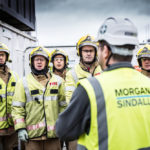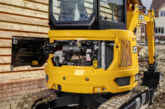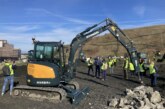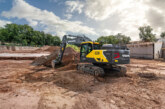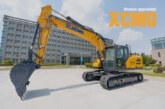The British like nothing better than to talk about the weather, but the topic is especially important for those working in construction this winter.
Last year we saw the ‘Beast from the East’ tear through the construction industry. The sector shrank by 3% in February 2018 compared to the previous year, according to the Office for National Statistics. And while weather in the UK can be unpredictable, construction doesn’t stop when the cold strikes. So it’s important that workers and employers know how to keep warm and safe this winter, to lower the risks of accidents and injury.
Falls are among the most common construction site accidents. If you add snow and ice into the mix, the hazard increases significantly. One million workers in the UK are injured or become ill due to conditions at work every year and costs the industry £15 billion, as reported by the Health and Safety statistics.
Here are some ways to keep workers safe and warm in the wintry weather.
Protecting workers this winter
When I was working on a construction project off the west coast of Scotland I experienced all four seasons in one day. Raining one minute, sunshine the next and we even had our fair share of snow.
It’s important to keep an eye on the weather forecast so jobs can be scheduled to avoid outdoor work during the cold and wet weather.
To ensure my team was equipped to deal with all the elements Mother Nature threw at us, I made sure the right level of PPE was available. Clothing designed to protect construction workers against adverse weather is classified as Personal Protective Equipment (PPE) and must be provided free of charge by their employer.
These include things like padded and waterproof clothing, safety footwear and thermally protective gloves and socks.
According to the HSE, any additional protective clothing must be compatible with equipment that has been issued to protect against work activity hazards. For example, if workers need hard hats and earmuffs to keep their ears warm, you need to make sure they can be used together.
Indoor work in an unfurnished building can be just as cold, and sometimes colder, so it’s important to use safe, regularly inspected portable heaters where necessary.
Access to adequate welfare facilities is essential at any time of the year, but during the cold winter season it’s even more important. Rest areas must be heated and workers should have access to warm drinks and means to heat up their food. Clothing can get soaked in the typical British rain, so drying rooms need to be provided to prevent anyone catching a cold.
So remember, stay warm and protect yourself and your staff from the cold weather. After all, the most important thing is to have a safe and healthy winter period.

